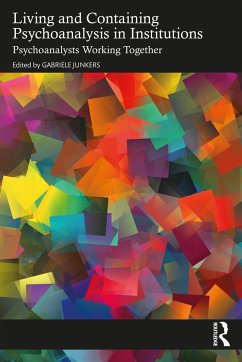Encompassing diverse perspectives on the psychoanalyst as individual, social being, and member of psychoanalytic institutions, this book provides practical and informed answers to the question of how psychoanalysts can take care of their psychoanalytic institutions. The book draws urgent attention to concerns about how the field of psychoanalysis can be sustained into the future, and sets out several studies in institutional dynamics as a form of provocation for psychoanalysts to reflect on their position as members of the institution and to act courageously in their collective efforts. Correlations between institutional dynamics and familial relationships are emphasized, alongside varied and detailed accounts of the styles of leadership required to facilitate improved cooperation in psychoanalytic institutions. The authors draw on their experiences as group participants, leaders and observers at both local and supranational levels, to investigate the historical context underpinning the disillusion among psychoanalysts, offering readers richly informed perspectives on how to nurture collegial ethics. With an emphasis on a shared ethics of responsibility, and the work involved in building secure professional relationships among psychoanalytic groups of all kinds, this book will prove essential to those engaged in understanding the work involved in psychoanalysis, whether in training or in practice.
Hinweis: Dieser Artikel kann nur an eine deutsche Lieferadresse ausgeliefert werden.
Hinweis: Dieser Artikel kann nur an eine deutsche Lieferadresse ausgeliefert werden.








